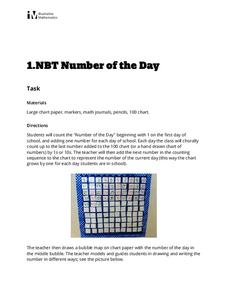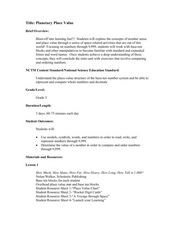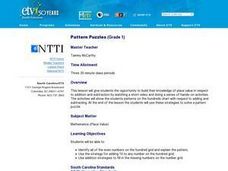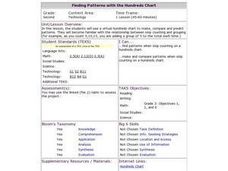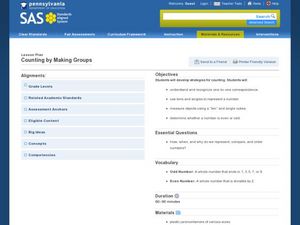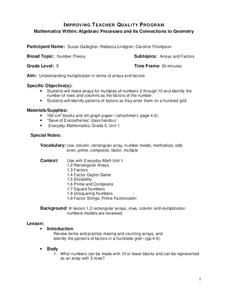Illustrative Mathematics
Number of the Day
Daily routines not only help to manage classrooms, they can also provide students with rich opportunities for learning. This activity supports young learners in developing their number sense by counting up the school days on a class...
Super Teacher Worksheets
Number Patterns
Pattern recognition is an essential step in the development of young mathematicians fluency with the four basic operations. This simple skills practice worksheet asks children identify and complete three different...
K-5 Math Teaching Resources
One Hundred Chart Template
There are hundreds of learning opportunities with this hundreds chart. Just print, laminate, and you're ready to get counting.
Curated OER
Adding Tens
Second graders explore and discuss adding 10 as they predict number patterns with the hundred chart. They work in pairs, groups choose a number, 1-9, and predict what happens if they add 10 to the number. Students make-a-ten strategy...
Scholastic
Adding and Subtracting Ten
Developing fluency with basic addition and subtraction is fundamental to the success of all young mathematicians. This four-day lesson series begins with learners using ten-frames and hundreds charts to recognize patterns when adding and...
Curated OER
Learning Even and Odd Numbers
In this math lesson, young learners receive a numeral written on a paper and arrange themselves in chronological order. They illustrate skip counting by 2's, 5's, and 10's using their numerals and then complete an individual 100 chart by...
Curated OER
Planetary Place Value
Third graders explore place value to the ten thousands place. This incredibly thorough, 24-page lesson has learners construct, order, and compare numbers to 9,999. This three-day lesson includes reteaching and extension activities...
Curated OER
Pattern Puzzles
A short video introduces place value in addition and subtraction. As a class, your students identify all even numbers up to one hundred and explain the pattern. They use addition strategies to fill in the missing numbers on the number grid.
Curated OER
Ten by Ten
Learners participate in hands-on activities using a hundreds chart and counting toes and fingers. They discover the patterns that are created when counting by ten. After a lecture/demo, learners practice by using a worksheet embedded in...
Curated OER
Using the Sounds of Words Reading Task
Young readers demonstrate phonemic awareness in words and blends, and recognize 100 high-frequency words. Use a nursery rhyme to point out rhyming words, and change the words by putting a new letter at the beginning. Each learner will...
Curated OER
Counting Chart
Elementary learners discover counting through a counting chart. In this math lesson, students identify numbers 1-100. They then point or recite their counting numbers.
Curated OER
Patterns
Fifth graders recognize shape and number patterns. In groups, 5th graders use strategies to find patterns. They extend the patterns and give explanations as to how they found the pattern. Students use the computer and the hundreds...
Curated OER
I Can Use a Worm to Count
Kindergarteners use worms, puppets or other props to practice counting to 100. First, they listen to a read aloud of Count Worms by Roger Hargeaves. A worm pattern is used to count to 100, with each segment of the worm...
Curated OER
Finding Patterns with the Hundreds Chart
Students review their numbers up to one hundred. Using a chart, they compare and predict patterns that might be in the numbers. They practice skip counting and grouping numbers. Using a spreadsheet, they graph different sets of numbers...
Curated OER
Skip-counting Practice
Students practice skip counting. In this skip counting instructional activity, students practice skip counting using hundreds boards and patterns. Students complete several examples and problems to ensure their understanding.
Curated OER
Counting by Making Groups
First graders represent, compare, and order numbers. In this counting skills lesson, 1st graders use manipulatives to demonstrate one-to-one correspondence and to represent numbers. This lesson includes a teacher script to guide the lesson.
K-5 Math Teaching Resources
Multiplication Chart
This is not your run-of-the-mill multiplication chart. Going beyond the standard 12 x 12 limit, this resource includes multiplication facts up through 12 x 20, making it great for supporting children as they continue working toward being...
Lesson This!
Math Lesson Plan: Handprint Counting by 5's
A handprint worksheet is provided to help youngsters practice skip counting by 5s. As a follow up, you could have little ones gather into groups to skip count their own fingers by fives.
Curated OER
"Let's Write a Song"
Fourth graders analyze, brainstorm and practice playing a melody/pattern with rhythm, tempo, dynamics, and instrumental pieces of many styles. In addition, they create an original piece of music.
Curated OER
Calendar Counting
Students demonstrate how to count by 2's. In this number sense lesson, students review skip counting on the hundreds chart and recognize the pattern of counting by 2's. Students use a reproducible of a calendar to color in the days as...
Curated OER
Mathematics Within: Algebraic Processes and Its Connections to Geometry
Fifth graders discover the connections between algebra and geometry. With a focus on arrays and factors, they are introduced to multiplication. They develop an array for multiples of 2 through 10 and identify the factors of each row....
Curated OER
Aging of Trees
Students examine tree rings to determine its age. In this tree ring lesson, students examine core tree samples, identify the tree rings, and then determine its age. Students complete a worksheet, deciding which of the two core...
Curated OER
Making Words
Third graders spell words and define homophone. In this making words lesson, 3rd graders decipher words from letter strips in an effort to identify the "secret word". Students use a set of letters to spell different words.
Curated OER
Place Value
First graders practice place value by completing problems that allow them to group 10 items together to create groups of 10 and see what is left over. In this place value lesson plan, 1st graders use cups to put 10 items in them, and...
